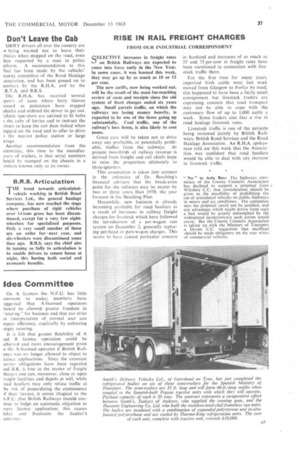RISE IN RAIL FREIGHT CHARGES
Page 39

If you've noticed an error in this article please click here to report it so we can fix it.
FROM OUR INDUSTRIAL CORRESPONDENT
SELECTIVE increases in freight rates 1,—) on British Railways are expected to come into force early in the New Year. In some cases, it was learned this week, they may go up by as much as 10 or 12 per cent.
The new tariffs, now being worked out, will he the result of the most far-reaching review of costs and receipts since the old system of fixed charges ended six years ago. Small parcels traffic, on which the railways are losing money heavily, is expected to be one of the items going up substantially. Coal traffic, one of the railway's best items, is alSo likely to cost more.
" Great care will be taken not to drive away any profitable, or potentially profitable, traffics from the railways: At present two-thirds of railway revenue is derived from freight and rail chiefs hope to raise the proportion "ultimately to three-quarters.
This assumption is taken into account in the estimates of Dr. Beeching's financial advisers that the break-even point for the railways may be nearer by two or three years than 1970, the year forecast in the 'leeching Plan.
Meanwhile, new business is already becoming available for road hauliers as a result of increases in railway freight charges for livestock which have followed the introduction of a per-wagon rate system on December 2, generally replacing per-head or part-wagon charges. This seems to have caused particular concern
in Scotland and increases of as much as 55 and 75 per cent in freight rates have been mentioned in connection with live
stock traffic there.
For the first time for many years, imported Irish cattle were last week moved from Glasgow to Forfar by road; this happened to have been a fairly small. consignment but livestock traders are expressing concern that road transport may not be able to cope with the customary flow of up to 1,000 cattle a week. Some traders also fear a rise in road haulage livestock rates. •
Livestock• traffic is one of the subjects being reviewed jointly. by British :Rail.; ways, British Road Services and the Road. Haulage Association. An R.H.A. Spokesman told me this week that the Association was confident that road . hauliers would be able to deal with any increase. in livestock traffic.
No" to Artie Ban: The highways committee of the County Councils Association has declined to support a 'proposal from Wiltshire C.C. that consideration should be given to the possibility of prohibiting the use of articulated vehicles on public highways in snowy and icy conditions. The committee says the proposal could not be justified, and any advantage which might derive from such a ban would be greatly outweighed by the widespread inconvenience such action would cause, But the County Councils Association is taking up with the Ministry of Transport a Devon C.C. suggestion that mudfiaps should be made obligatory on the rear wings of commercial vehicles.




















































































































